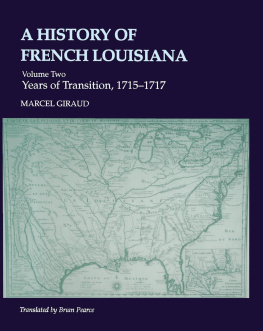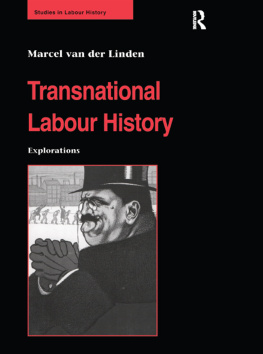Marcel Giraud - A History of French Louisiana
Here you can read online Marcel Giraud - A History of French Louisiana full text of the book (entire story) in english for free. Download pdf and epub, get meaning, cover and reviews about this ebook. year: 1974, publisher: Louisiana State University Press, genre: Romance novel. Description of the work, (preface) as well as reviews are available. Best literature library LitArk.com created for fans of good reading and offers a wide selection of genres:
Romance novel
Science fiction
Adventure
Detective
Science
History
Home and family
Prose
Art
Politics
Computer
Non-fiction
Religion
Business
Children
Humor
Choose a favorite category and find really read worthwhile books. Enjoy immersion in the world of imagination, feel the emotions of the characters or learn something new for yourself, make an fascinating discovery.
- Book:A History of French Louisiana
- Author:
- Publisher:Louisiana State University Press
- Genre:
- Year:1974
- Rating:4 / 5
- Favourites:Add to favourites
- Your mark:
- 80
- 1
- 2
- 3
- 4
- 5
A History of French Louisiana: summary, description and annotation
We offer to read an annotation, description, summary or preface (depends on what the author of the book "A History of French Louisiana" wrote himself). If you haven't found the necessary information about the book — write in the comments, we will try to find it.
A History of French Louisiana — read online for free the complete book (whole text) full work
Below is the text of the book, divided by pages. System saving the place of the last page read, allows you to conveniently read the book "A History of French Louisiana" online for free, without having to search again every time where you left off. Put a bookmark, and you can go to the page where you finished reading at any time.
Font size:
Interval:
Bookmark:

FRENCH LOUISIANA
Originally published as Histoire de la Louisiane franaise, Tome Second: Annes de transition (1715-1717).
Translation copyright 1993 by Louisiana State University Press
All rights reserved
Manufactured in the United States of America
First printing
02 01 00 99 98 97 96 95 94 93 5 4 3 2 1
Typeface: Palatino
Typesetter: Graphic Composition, Inc.
Printer and binder: Thomson-Shore, Inc.
A history of French Louisiana.
Includes bibliographical references and index.
Contents: v. 1. The reign of Louis XIV, 1698-1715,
translation by Joseph C. Lambertv. 2. Years of
transition, 1715-1717, translated by Brian Pearce
v. 5. The company of the Indies, 1723-1731,
translated by Brian Pearce.
1. LouisianaHistoryTo 1803. I. Title.
F372.G513 976.3 71-181565
ISBN 0-8071-0058-7 (v. 1)

| AE | Archives Etrangres (Archives du Ministre des |
| Affaires Etrangres, Quai dOrsay, Paris) | |
| Mem. & | |
| Doc. | Mmoires et Documents |
| AN | Archives Nationales |
| AC | Archives des Colonies* |
| AHM | Archives Hydrographiques de la Marine |
| AM | Archives de la Marine* |
| BN | Bibliothque Nationale, Paris |
| FF | Manuscripts, Fonds Franais |
| FFNA | Manuscripts, Fonds Franais, Nouvelles |
| Acquisitions | |
| LSHM | Louisiana State Historical Museum, New Orleans |
| La Rochelle, Rivire and Soullard | Notarial files of the practice of Rivire and Soullard (Archives de la Charente-Maritime, La Rochelle) |
| PRO | Public Record Office, London |
| Sem. | Archives du Sminaire Laval, Qubec |
| *AU letters in the series AC, C 9A, C 11A, C 13A, C 13B, C 13C, and AM, B 1, B 3, and B 7, when given without indication of addresses, are addressed to the Council of the Navy. Those in AC, B, and AM, B 2, unless otherwise indicated, emanate from the Council of the Navy. |
New Personalities
Font size:
Interval:
Bookmark:
Similar books «A History of French Louisiana»
Look at similar books to A History of French Louisiana. We have selected literature similar in name and meaning in the hope of providing readers with more options to find new, interesting, not yet read works.
Discussion, reviews of the book A History of French Louisiana and just readers' own opinions. Leave your comments, write what you think about the work, its meaning or the main characters. Specify what exactly you liked and what you didn't like, and why you think so.









